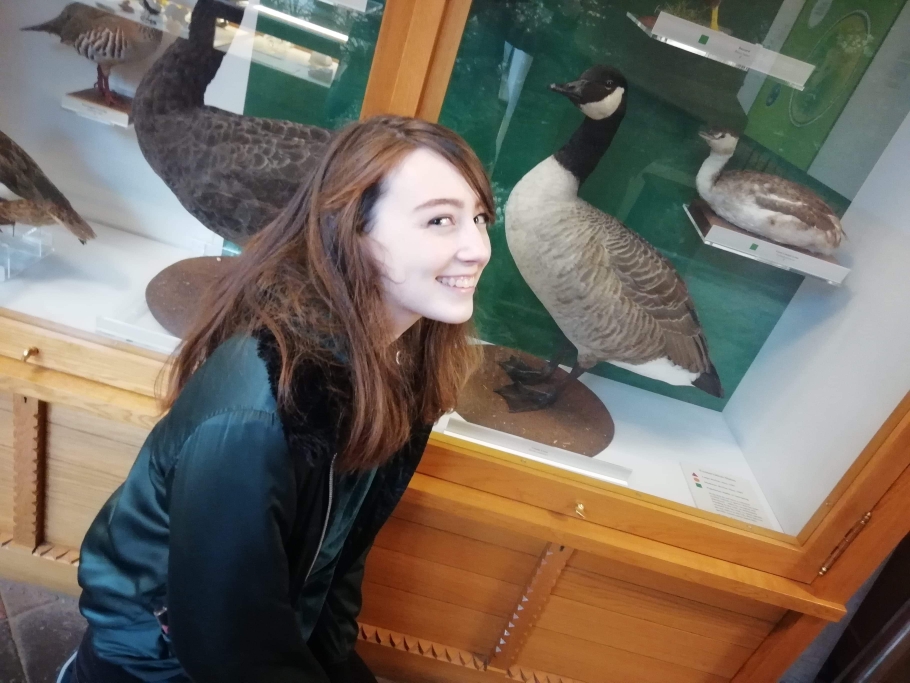Hey, I’m Lucy. I’m currently a second year biologist at Worcester College in Oxford. Coming from a countryside area in the south of England I particularly enjoy the nature and ecology side of biology.
Why did you decide to study your subject at Oxford?
All through school I was definitely more of a science and maths person than humanities. Every year I would watch various nature documentaries and programmes like Springwatch/Autumnwatch, and whenever they said ‘science has taught us this, science has shown that…’, I thought I wanted to be part of that biological science!
But documentaries weren’t all, I also read some good Biology books that really interested me, like “Being a Beast” by Charles Foster and “Wonderland” by Brett Westwood & Stephen Moss. Besides, I also really enjoy drawing or painting artwork and photography of nature around me, so my passion for science has always been a part of my creative side too.
Reading about various unis, I found that some Biology courses were quite skewed towards areas the university specialised in, for example more biomedical or molecular biochemistry topics. However the Oxford course content covered everything and allowed for a broader range of options to choose over the second/third year and I was attracted by this flexibility and varied content.
What was your experience of the application process?
I went to the open day for Oxford in Year 12 to have a good look around potential colleges and the science area, including the very impressive Natural History Museum where most biology lectures take place (the picture is me with a Canada goose in the museum!).
My sixth form college encouraged us to start writing our personal statements towards the end of Year 12, so that a tutor could check the draft after the summer holidays. I sent the best version in with my application and was very happy to receive an interview letter a few weeks later.
You get two interviews for Biology. I had my first one at the college I applied to (Worcester) which was also where I stayed overnight until I had my second interview at New College.
I went to the common room in the evening to chat to other interviewees, some of whom also got in and I’m still great friends with. I was nervous before my Oxford interviews, but my sixth form had given me a mock one so I was somewhat prepared. I highly recommend asking your school for a mock interview, if you intend to apply. If that’s not possible, there are online resources from Oxford such as example type questions, which will hopefully help prepare you.
How were the first weeks of you ‘Oxford experience’ like?
I’d never been away from home for more than a week before, and I knew I was going to miss my dog so much so I put lots of pictures of her up in my room as soon as I moved in.
Part of the great thing about the college system is the relatively small community at your college, with only about a hundred or so freshers, as compared to the thousands of freshers university wide. The activities put on in freshers’ week helped everyone introduce each other, and people remembered each other from interviews too. I came from a state school but it didn’t matter to anyone, all were just glad to meet new people. I was on the freshers’ committee in my second year, helping plan the week to be as great as possible.
I settled into the work routine fairly quickly by making sure I stuck to a to-do list during the day whilst leaving plenty of time for socialising in the evenings.
What does a typical day during term look like?
A typical weekday consists of usually 1 or 2 lectures in the morning. I must admit I’m not a morning person so it’s always a bit of a rush to get out on time aha. For lunch my friends and I sometimes go out to a café; there’s a lot of little student style cafés in Oxford! Other days I come back and make my own food or stop off at the shops on the way back to college. On one afternoon per week I would have a tutorial. On all other days, the afternoon is when I get the majority of my work done, with a few breaks in between. Uni Parks with its gardens and sports fields close to the science area in northeast Oxford is a lovely place to go for a walk if you need a break!
In first year, I had dinner in Hall most days whereas in second year I tended to make my own. The Hall is the place in College where students can have meals and sometimes formal dinners.
I’m part of Worcester’s orchestra so there’s a rehearsal in college for an hour one night a week. I try to stop working around 8pm so there’s time to watch some TV/Netflix or socialise with my friends, usually going down to the college bar where there’s a quiz machine and table football as well as drinks/snacks. Trying to get to sleep before midnight is a good idea, although that doesn’t always happen for me. Over the weekend, I usually end up doing some more work like writing up lecture notes and essays, although there’s more time to relax then too.
What is your experience of the Oxford tutorial system?
Tutorials are pretty unique to Oxford. In first year, they were all with my college tutor who set us essays (around 2,000 words) every week based on a reading list. It’s good to do some of your own research to find more articles to include, as tutorial essays are designed to consolidate your understanding of lecture concepts and extend them into new knowledge and aspects you find particularly interesting about the topic.
In second year, you get to book your tutorials on an online system, which means you can do them with a variety of tutors/graduate students who are more specialised in the area they’re offering a tutorial on. Some tutors also offer tutorials on the statistics and maths side of the course, so not every week includes essay writing. Tutorials are also great for making more friends in your subject as you can book them with people from other colleges for Biology.
What skills will you gain from your course?
Tutorials help with scientific writing and how to synthesise coherent arguments concisely, which is really important if you want to go into further scientific work after graduating. There are also lots of practical classes covering a range of subjects across labs and fieldwork; Oxford is great for this as the labs are very new and modern and Wytham Woods, a site that’s been used for scientific studies for decades, is just nearby for all the ecology-type fieldwork.
Engaging in tutorials also helps develop your listening and speaking skills when talking about complex ideas and formulating arguments to get your point across. The tutors are world-class experts and may seem scary at first, but you will really develop your confidence by having frequent interactions with them, something that perhaps wouldn’t happen so often at other universities.
What is College Life like for you?
Worcester is an absolutely beautiful college, with a lake, lawn and orchard, perfect for walking round when you need a break from work. You can buy apple juice made from the orchard apples there and I’ve even seen deer and badgers around college, which is really great as a Biology student!
The college system is fantastic compared to other universities that are full of thousands of students everywhere, as each college is like it’s own little community and it doesn’t take long to know most people in your college; you can make friends with people in other years, too. The college parent system was also really helpful and comforting when settling in. First year students get a family of two (or more!) “parents” from second year, at least one of whom is doing their subject. The older students can then guide the freshers and share some of the wisdom they’ve gained about Oxford life.
Whilst I have good friends at my college, I also met a lot of great like-minded people through the Biology course, especially during the first year field trip to Wales. That’s how I get to explore lots of other colleges like Lady Margaret Hall (LMH) and Merton!
Anything else you would like to add about your student life at Oxford?
Say yes to as many opportunities as possible! There’s so much to do besides just work and you’ll form friendships that are going to last a very long time, so don’t have any regrets and enjoy it! It’s not all about work, work, work!
This article is part of our series of ‘Student profiles’ where we explore the student life at Oxford. Did you ever wonder how students come to study at Oxford and how the application process feels like? What about all the quirky Oxford traditions, the college system and tutorials? And how does all this ‘Oxford experience’ differ between natural and social science courses? In this series we ask students to tell us about their experience.





